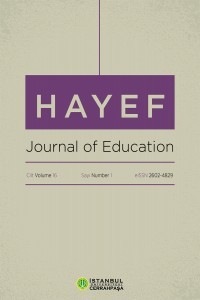ÜSTÜN ZEKÂLI VE YETENEKLİ BİREYLER İÇİN FARKLILAŞTIRILMIŞ SOSYAL BİLGİLER DERSİNDE UYGULANABİLECEK ÖĞRETİM STRATEJİLERİ
Üstün zekâlı ve yetenekli bireyler eğitim hayatları boyunca; sahip oldukları bilişsel ve duyuşsal farklılıkları ve karakteristik özelliklerine yönelik ihtiyaçları destekleyen öğretim yaklaşımlarına gereksinim duyarlar.Sosyal bilgiler dersi; üstün zekâlı ve yetenekli bireylerin eğitimi açısından ileri düzeyde karmaşık ve kapasitelerine uygun seçenekler geliştirebilmesi, farklılaştırılmış öğretim uygulamalarına oldukça uygun bir ders olması nedeniyle dikkat çekicidir. Günümüz dünyasında hızla yaşanan değişimlere ayak uydurabilecek, öğrenci gereksinimlerine cevap verebilecek öğretim programlarına, bilgi ve beceri gelişimlerinin yanında kendi kendilerine yeterli, yeni fikirlerin üretimine katkıda bulunabilecek düzeyde yaratıcı düşünen, otonom öğrenen bireylerin yetiştirilmesine ihtiyaç duyulmaktadır.Bu çalışmanın amacı; üstün zekâlı ve yetenekli bireylere sınıf ortamlarında kapasitelerini kullanabilme fırsatları yaratabilmek adına, farklılaştırılmış sosyal bilgiler dersi öğretimi konusunda faydalı olabilecek uygulamalar hakkında alan yazından önemli örneklerin verilmesi, en iyi uygulamaları hangi bileşenlerin meydana getirdiğini tartışarak, uygulamaları destekleyen ve zorlaştıran ipuçlarının tanımlanmasıdır.
Anahtar Kelimeler:
Üstün zekâ ve yetenek, sosyal bilgiler öğretimi, farklılaştırma, öğretim stratejileri
-
Gifted and talented individuals require instructional approaches that recognize and attempt to satisfy their needs resulting from different viewpoints and characteristics of theirs- which, in turn, are brought about by their cognitive and affective differences- as well as recognizing and encouraging different viewpoints. Social sciences instruction stands out among others in that it is complicated enough to capture the attention of gifted and talented individuals, it can generate alternatives in accordance with their capacities which can attract students with varying capacities. The rapid changes in our modern world call for a curriculum that can meet the requirements of students and catch up with developments; in addition, these changes require individuals to be not only receptive to certain skills and knowledge but also independent, selfefficient, and able to contribute to the generation of new information and think critically. The purpose of the present study is to collect evidence of strategies for differentiated social sciences instruction, which can enable gifted and talented individuals to use their capacities in the classroom, to present sample strategies, to discuss what components constitute best strategies, and to play a supportive role in defining their drawbacks through clues
Keywords:
Gifted and talented, social sciences instruction, differentiation, instructional strategies,
___
- Baysal, Z. N. (2005). Hayat bilgisi/sosyal bilgiler öğretiminde probleme dayalı öğrenme için problem durumları oluşturma. Türk eğitim bilimleri dergisi, 4, (3), 471-485.
- Davaslıgil, Ü., ve Leana, M. Z. (2004). Üstün zekalıların eğitimi projesi. A., Kulaksızoğlu, A. E., Bilgili, ve M. R., Şirin (Ed.), I.Türkiye üstün yetenekli çocuklar kongresi. Üstün yetenekli çocuklar bildiriler kitabı içinde. İstanbul: Çocuk Vakfı Yayınları.
- Delisle, R. (1991). Gifted students and social studies. J. P.Shaver (Ed.), Handbook of research on social studies teaching and learning içinde, NewYork: McMillian Publishing Company.
- Delisle, R. (1997). How to use problem-based learning in the classroom. Virginia: Association for Supervision and Curriculum Development.
- Fox, J., ve Hoffman, W. (2011). The differentiated instruction book of lists: Stratejies for differentiating social studies. USA: Published by Jossey-Bass AWiley Imprint
- Gallagher, J. (2006). Models that guide teaching the gifted. Gifted childern gifted education. USA: Great Potential Press.
- Kabapınar, Y. (2012). Kuramdan uygulamaya. Hayat bilgisi ve sosyal bilgiler öğretimi (3. bs.). İstanbul: Pegem Akademi.
- Maker C. J. ve Schiever S. W. (2005). Benjamin Bloom and David Krathwohl: The cognitive and affective taxonomies. Teaching models in education of the gifted (3. bs.). USA: Pro.ed an International Publisher Inc.
- Maker C. J. ve Schiever S. W. (2009). Curriculum development and teaching strategies for gifted learners (3. bs.). USA: Pro-ed, Inc.
- Milli Eğitim Bakanlığı (2005). Sosyal Bilgiler Öğretim Programı. İlköğretim sosyal bilgiler dersi 4-5. Sınıflar öğretim programı ve klavuzu. Ankara: MEB Yayınları.
- Moye, V. H. (1998). Problem-based learning in social studies. Cues to culture and change. USA: Pearson.
- Neff, H. B. (1967). Ways to help gifted students like social studies. Gifted child quarterly, 11, 108-111.
- Ponder, G., ve Hirsh, S. A. (1981). Social studies curricula for the gifted: Lessons from other pasts. Roeper review, 4 (2), 17-19.
- Popham, D. (1971). Teaching gifted social sciences in grades ten through twelve. Sacramento, CA: California State Departmentof Education.
- Tannenbaum, A. J. (2003). Nature and nurtune of giftedness. Colangelo N., Davis G.A. (Ed.), Conceptions and identification: Handbook of gifted education içinde. USA: Pearson Education.
- VanTassel-Baska, J., ve Stambaugh, T. (2006). Comprehensive curriculum for gifted learners (3. Bs.). USA: Pearson Education Inc.
- VanTassel-Baska, J., ve Stambaugh, T. (2009). Üstün zekalı ve yetenekli öğrenciler için sosyal bilgiler eğitim programı. (S. Emir, N. G. Kahveci, M.
- Z. Leana, Z. Ö. Atalay, M. Özyaprak, E. Kanlı ve ark., Çev.), Üstün zekalı ve yetenekli öğrenciler için kapsamlı eğitim programı içinde. İstanbul: Bilimsel Açılım Yayıncılık.
- VanTassel-Baska, J., ve Brown, E. F. (2007). Towards best practice: An analysis of the efficacy of curriculum models in gifted education. Gifted child quarterly, 51, 342-358.
- Başlangıç: 2004
- Yayıncı: İstanbul Üniversitesi-Cerrahpaşa
Sayıdaki Diğer Makaleler
KARAKTER ÇÖZÜMLEMELERİNİN KURGUDAKİ YERİ: “BİNTEPE’NİN HAYALETİ” ÖRNEĞİ
İNGİLİZCE ÖĞRETİMİNDE AKILLI TAHTA KULLANIMININ İLKOKUL ÖĞRENCİLERİNİN BAŞARISINA ETKİSİ
ULUSLARARASI BAKALORYA PROGRAMINDA TİYATRO VE DRAMA DERS MÜFREDATININ MODEL ANALİZİ
İLKOKUL 4. SINIF ÖĞRENCİLERİNİN EMPATİ KAVRAMINA İLİŞKİN GÖRÜŞLERİ
ÜSTÜN YETENEKLİ ÖĞRENCİLERDE BEKLENMEDİK DÜŞÜK AKADEMİK BAŞARI
TÜRKÇE ÖĞRETMEN ADAYLARININ DİLSEL DEĞER KAVRAMINA İLİŞKİN YETERLİK DÜZEYLERİ
İKİNCİ SINIF İNGİLİZCE DERSİ VE PROGRAMINA İLİŞKİN ÖĞRETMEN GÖRÜŞLERİNİN İNCELENMESİ
Coşkun KÜÇÜKTEPE, Seval EMİNOĞLU KÜÇÜKTEPE, Yasemin BAYKIN
ÇİFT ANADAL PROGRAMINDA OKUYAN ÖĞRENCİLERİN GÖRÜŞLERİ: BİR DEĞERLENDİRME ÇALIŞMASI
Sinan HOPCAN, Elif POLAT, Tufan ADIGÜZEL
